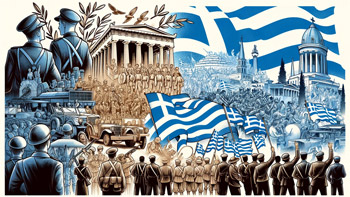 Ohi Day in Greece
Ohi Day in Greece


Ohi Day, celebrated every year on October 28th, is a significant national holiday in Greece, commemorating a defining moment in the nation's history during World War II. The word "Ohi" means "No" in Greek, and the day marks Greece's refusal to surrender to the Axis powers in 1940. This refusal is a symbol of courage and resilience, epitomizing the Greek spirit of standing firm against oppression and injustice.
The story of Ohi Day dates back to the early years of World War II. On October 28, 1940, the Italian Ambassador to Greece, Emanuele Grazzi, delivered an ultimatum from Benito Mussolini to Greek Prime Minister Ioannis Metaxas. Mussolini demanded free passage for his troops to occupy strategic locations in Greece. Metaxas's response was firm and clear, simply stating "Ohi" or "No." This response led to Greece's entry into World War II on the side of the Allies, as Italian forces invaded Greece shortly thereafter.
The Historical Context of Ohi Day
The refusal to accept the Italian ultimatum was a turning point in Greek history. Despite being outnumbered and less equipped, the Greek army resisted fiercely and managed to push back the invading forces. This resistance not only boosted Greek morale but also gained international admiration. The Greek counteroffensive was the first successful resistance against the Axis powers in Europe, providing a glimmer of hope to occupied countries and demonstrating that the Axis was not invincible.
Greece's involvement in World War II had a significant impact on the course of the war. The resistance delayed the Axis's plans to advance towards the Soviet Union, a strategic delay that is often credited with affecting the outcome of the war. The Greek resistance became a symbol of bravery and determination against overwhelming odds, inspiring other nations and boosting the morale of the Allied forces.
Celebrations and Traditions on Ohi Day
Ohi Day is marked by a series of events and traditions that pay homage to the heroes who fought during World War II. The most prominent feature of the celebrations is the military parades that take place in cities and towns across Greece. These parades showcase the strength and discipline of the Greek military and serve as a tribute to those who fought for the nation's freedom. School students also participate in these parades, symbolizing the passing of patriotic values to the younger generation.
In addition to the parades, various cultural events take place throughout the country. These events include exhibitions, school presentations, and public speeches that delve into the historical significance of Ohi Day. These activities not only commemorate the past but also serve as educational opportunities, particularly for young people, to learn about this crucial period in Greek history and the broader context of World War II.
The Significance of Ohi Day in Modern Greece
Ohi Day is more than a historical commemoration; it is a reflection of the enduring Greek spirit and the nation's commitment to freedom and democracy. The events of October 28, 1940, have become a part of the collective Greek consciousness, symbolizing the country's resilience in the face of adversity. This day reminds Greeks of the importance of unity and patriotism in protecting their nation's sovereignty and democratic values.
In modern times, Ohi Day has also taken on a broader meaning. It's seen as a day to celebrate freedom and human rights, not just in Greece but around the world. The story of Greece's defiance against the Axis powers resonates with universal themes of resistance against tyranny and the fight for self-determination. It serves as a reminder of the sacrifices made by previous generations to secure the liberties that people enjoy today.
Ohi Day's Impact on Greek Culture and Identity
Ohi Day has significantly influenced Greek culture and national identity. It is a day that brings together Greeks from all walks of life to celebrate their history and heritage. The holiday has fostered a strong sense of national pride and unity, qualities that are deeply embedded in the Greek psyche. Additionally, Ohi Day has contributed to the preservation of historical memory, ensuring that the stories and sacrifices of those who fought in World War II are not forgotten.
The holiday is also an opportunity for Greeks, both in Greece and in the diaspora, to reconnect with their roots. For Greeks living abroad, Ohi Day is a reminder of their homeland's history and a chance to celebrate their cultural heritage. This shared history and culture serve as a bond that unites Greeks around the world, regardless of their geographical location.
In essence, Ohi Day is a poignant reminder of Greece's historical struggles and triumphs. It's a day that not only commemorates the past but also inspires the present and future generations. By remembering and honoring the bravery and sacrifices of those who said "No" to oppression and fought for freedom, Greeks reaffirm their commitment to the values of democracy, independence, and human rights. Ohi Day, therefore, stands as a testament to the enduring spirit and resilience of the Greek nation and its people.